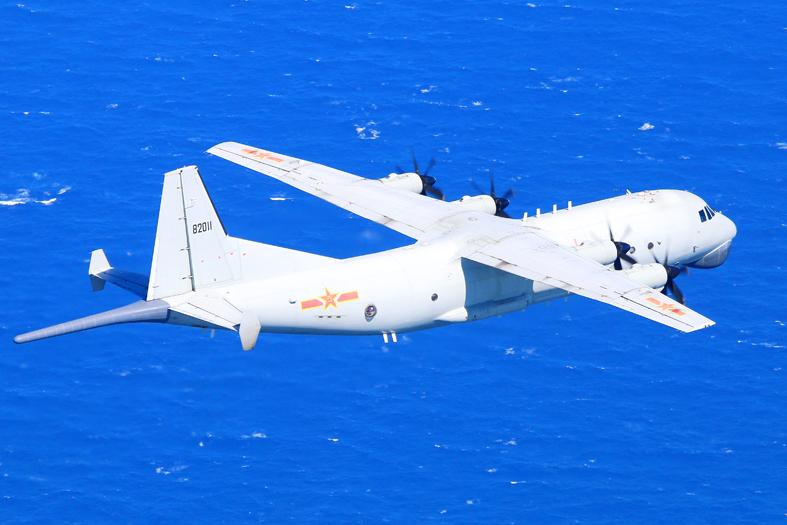The military tracked Chinese warplanes and responded as they encroached on Taiwan’s air defense identification zone (ADIZ) twice in the past four days, the Ministry of National Defense said yesterday.
Chinese fighter jets and bombers encroached on the nation’s ADIZ on Saturday last week and again on Monday, the ministry said.
On Monday, 10 aircraft — four J-16 multirole fighters, four J-10 multirole fighters, a KJ-500 airborne early warning and control aircraft and a Y-8 marine patrol aircraft — simultaneously approached Taiwan’s southwestern ADIZ from opposite directions before turning back, it said.

Photo courtesy of the Ministry of National Defense
The Japanese Ministry of Defense said that it also identified two Y-9 aircraft — one configured for reconnaissance and the other for electronic warfare — to Taiwan’s east.
Ministry spokesman Major General Shih Shun-wen (史順文) at a news conference said that the military successfully monitored the aircraft, and responded appropriately and effectively.
The military’s reaction to Chinese encroachment is determined by regulations on strategic and operational readiness, he said.
As a general principle, the military overestimates enemy capabilities, and generates a response that can anticipate and potentially block multiple, simultaneous hostile moves, Shih said.
The military avoids the “attrition trap” by varying its incursion responses by using a “high-low mix” of jets, slower aircraft, air-defense missile systems and electronic warfare, Air Force Chief of Staff Lieutenant General Huang Chih-wei (黃志偉) said.
Regarding the Japanese defense ministry’s statement, Huang said that each nation has its own criteria for disclosing defense information, but added that all threats to Taiwan were successfully monitored that day.
Association of Strategic Foresight research fellow Chieh Chung (揭仲) said that the incursions were Beijing’s way of showing its displeasure with the US, not immediate military threats.
Recent activity has been consistent with Beijing’s pattern of conducting a high-profile show of force when there is a development in US-China or Taiwan-US ties that it does not like, he said.
The Chinese aircraft were reportedly flying toward one another, but not conducting highly threatening maneuvers when circling Taiwan from opposite directions, he said, citing publicly available information.
On May 11, 2018, three formations of Chinese aircraft and ships circled Taiwan in the north, east and south, with the nearest observed aircraft only 56km from the naval base in Yilan County’s Suao Township (蘇澳), he said.
Two of the formations flew toward each other to encircle Taiwan’s eastern ADIZ, between the Bashi Channel and the Miyako Strait.
Two H-6K bombers, one Y-8 electronic warfare aircraft and one Tu-154 electronic warfare aircraft comprised the northbound group, while two H-6K bombers comprised the southbound one, he said.
The aircraft flew around Taiwan’s eastern airspace seven times from mid-April to late May 2018, Chieh said.
The military activity was a response to then-premier William Lai (賴清德) — now vice president — publicly describing himself as “a political worker for Taiwanese independence,” he said.
This story has been modified since it was first published.

A magnitude 5.6 earthquake struck off the coast of Yilan County at 12:37pm today, with clear shaking felt across much of northern Taiwan. There were no immediate reports of damage. The epicenter of the quake was 16.9km east-southeast of Yilan County Hall offshore at a depth of 66.8km, Central Weather Administration (CWA) data showed. The maximum intensity registered at a 4 in Yilan County’s Nanao Township (南澳) on Taiwan’s seven-tier scale. Other parts of Yilan, as well as certain areas of Hualien County, Taipei, New Taipei City, Taoyuan, Hsinchu County, Taichung and Miaoli County, recorded intensities of 3. Residents of Yilan County and Taipei received

Taiwan has secured another breakthrough in fruit exports, with jujubes, dragon fruit and lychees approved for shipment to the EU, the Ministry of Agriculture said yesterday. The Animal and Plant Health Inspection Agency on Thursday received formal notification of the approval from the EU, the ministry said, adding that the decision was expected to expand Taiwanese fruit producers’ access to high-end European markets. Taiwan exported 126 tonnes of lychees last year, valued at US$1.48 million, with Japan accounting for 102 tonnes. Other export destinations included New Zealand, Hong Kong, the US and Australia, ministry data showed. Jujube exports totaled 103 tonnes, valued at

TRUST: The KMT said it respected the US’ timing and considerations, and hoped it would continue to honor its commitments to helping Taiwan bolster its defenses and deterrence US President Donald Trump is delaying a multibillion-dollar arms sale to Taiwan to ensure his visit to Beijing is successful, a New York Times report said. The weapons sales package has stalled in the US Department of State, the report said, citing US officials it did not identify. The White House has told agencies not to push forward ahead of Trump’s meeting with Chinese President Xi Jinping (習近平), it said. The two last month held a phone call to discuss trade and geopolitical flashpoints ahead of the summit. Xi raised the Taiwan issue and urged the US to handle arms sales to

BIG SPENDERS: Foreign investors bought the most Taiwan equities since 2005, signaling confidence that an AI boom would continue to benefit chipmakers Taiwan Semiconductor Manufacturing Co’s (TSMC, 台積電) market capitalization swelled to US$2 trillion for the first time following a 4.25 percent rally in its American depositary receipts (ADR) overnight, putting the world’s biggest contract chipmaker sixth on the list of the world’s biggest companies by market capitalization, just behind Amazon.com Inc. The site CompaniesMarketcap.com ranked TSMC ahead of Saudi Aramco and Meta Platforms Inc. The Taiwanese company’s ADRs on Tuesday surged to US$385.75 on the New York Stock Exchange, as strong demand for artificial intelligence (AI) applications led to chip supply constraints and boost revenue growth to record-breaking levels. Each TSMC ADR represents